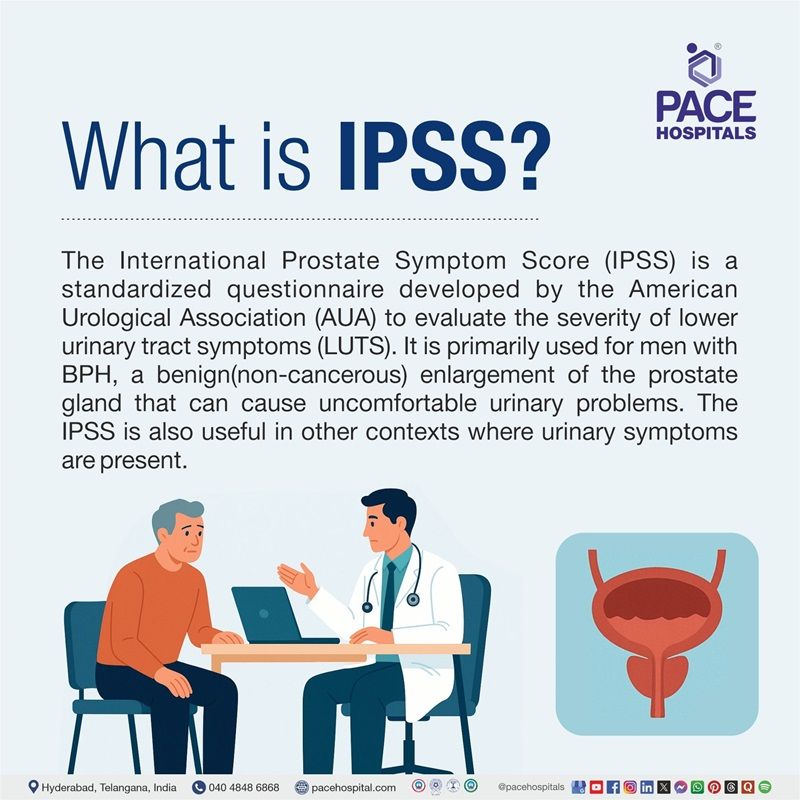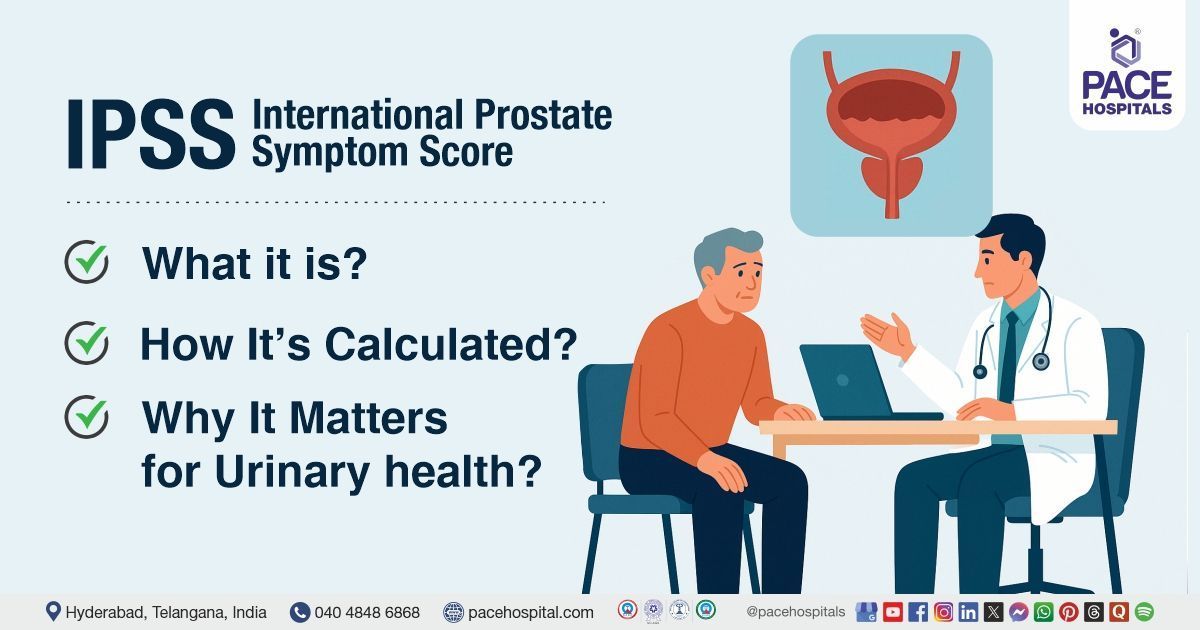IPSS Score: What It Is, How It’s Calculated, and Why It Matters for Urinary Health
PACE Hospitals
Download IPSS Questionnaire PDF
IPSS full form: International Prostate Symptom Score
Introduction
Urinary symptoms are a common concern, especially among men as they age. One of the most widely used tools to assess and quantify these symptoms is the International Prostate Symptom Score (IPSS). The IPSS is used to assist the diagnosis and management of urinary tract symptoms, particularly those related to benign prostatic hyperplasia (BPH).

What is the IPSS Score?
The IPSS is a standardized questionnaire developed by the American Urological Association (AUA) to evaluate the severity of lower urinary tract symptoms (LUTS). It is primarily used for men with BPH, a benign (non-cancerous) enlargement of the prostate gland that can cause uncomfortable urinary problems. The IPSS is also useful in other contexts where urinary symptoms are present.
The IPSS provides a simple, objective way to measure symptoms, track changes over time, and guide treatment decisions. It is recognized and used worldwide in both clinical practice and research.
Components of the IPSS Questionnaire
The IPSS questionnaire comprises of seven questions that focus on urinary symptoms experienced over the past month. These questions cover the following areas:
- Incomplete Emptying: Sensation of not emptying the bladder completely after urination.
- Frequency: Needing to urinate again less than two hours after finishing urination.
- Intermittency: Stopping and restarting multiple times while urinating.
- Urgency: Difficulty postponing urination.
- Weak Stream: Having a weak urinary stream.
- Straining: Needing to push or strain to begin urination.
- Nocturia: Number of times typically getting up to urinate from the time of going to bed at night until getting up in the morning.
Each of the first six questions is scored based on frequency, while the seventh (nocturia) is scored based on the number of times per night.
Scoring the IPSS
Each question is scored from 0 to 5, with higher scores indicating more severe symptoms. The scoring is as follows:
0: Not at all
1: Less than 1 time in 5
2: Less than half the time
3: About half the time
4: More than half the time
5: Almost always
For the nocturia question, the score is based on the number of times getting up at night:
0: None
1: Once
2: Twice
3: Three times
4: Four times
5: Five or more times
To calculate the total IPSS score, add up the scores for all seven questions. The overall score will range between 0 to 35.
Interpreting the IPSS Score
The overall IPSS score is divided into the following categories:
0 to 7: Mild symptoms
8 to 19: Moderate symptoms
20 to 35: Severe symptoms
These categories help to direct treatment recommendations. Mild symptoms may require lifestyle changes and monitoring, whereas moderate to severe symptoms may require additional evaluation or medical/surgical intervention.
The Quality of Life (QoL)
In addition to the seven symptom questions, the IPSS includes a single Quality of Life (QoL) question:
If you were to spend the rest of your life with your urinary condition just the way it is now, how would you feel about that?
This is scored from 0 (delighted) to 6 (terrible). While not part of the main IPSS score, it provides insight into how much the symptoms are affecting daily life and satisfaction.
Importance of the IPSS
The IPSS is valuable for several reasons:
- It provides a standardized way to measure and track symptoms over time.
- It helps clinicians decide when to start or adjust treatment.
- It facilitates discussion between patients and healthcare providers.
- It is used in clinical trials to assess the effectiveness of new treatments.
Use of the IPSS in Practice
The IPSS questionnaire can be filled out at home or in a clinical setting. Responses should reflect symptoms over the past month. Healthcare professionals use the score, along with other tests and medical history, to recommend the best course of action.
The IPSS can be used at baseline and at follow-up visits to monitor changes and treatment response.
Example of IPSS Calculation
For example, if the answers to the questions are as follows:
Incomplete emptying: 3
Frequency: 2
Intermittency: 2
Urgency: 3
Weak stream: 4
Straining: 2
Nocturia: 2
Total IPSS score = 3 + 2 + 2 + 3 + 4 + 2 + 2 = 18 (which falls into the moderate symptoms category).
Conclusion
The International Prostate Symptom Score (IPSS) is a tool for assessing urinary symptoms, especially in men with BPH. Understanding how to calculate and interpret the IPSS allows for effective management of symptoms and improvement of quality of life.
Share on
Request an appointment
Fill in the appointment form or call us instantly to book a confirmed appointment with our super specialist at 04048486868
Appointment request - health articles
Recent Articles











